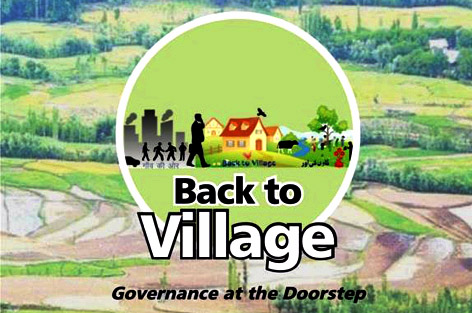An expenditure to the tune of Rs 353 crore has been incurred on the conduct of five Phases of the Back to Village (B2V) Programme in the Union Territory of Jammu and Kashmir and this initiative has led to strong momentum in the execution of works in almost all the districts.
Moreover, the Programme will be continued as it has helped a lot in strengthening governance at the grassroots level by bridging the gap between the administration and the people besides paving the way for resolution of thousands of complaints, which otherwise would not have come to the notice of the Government in a routine manner.
This was revealed by the Minister Incharge Rural Development and Panchayati Raj in a written reply to the question of BJP MLA Ranbir Singh Pathania in the Legislative Assembly today. “A total expenditure of Rs 35,342.92 lakh has been incurred on the Back to Village Programme since its inception in 2019 and five phases of the Programme have been conducted till date”, the Minister said.
As per the district-wise breakup, for the conduct of all the five phases of Back to Village Programme Rs 2369 lakh were spent in Doda, Rs 2432 lakh in Kathua, Rs 1417 lakh in Kishtwar, Rs 1842 lakh in Udhampur, Rs 1893 lakh in Poonch, Rs 2730 lakh in Rajouri, Rs 942 lakh in Reasi, Rs 1040 lakh in Ramban, Rs 1270 lakh in Samba, Rs 2828 lakh in Jammu, Rs 2568 lakh in Anantnag, Rs 2326 lakh in Budgam, Rs 877 lakh in Bandipora, Rs 2935 lakh in Baramulla, Rs 936 lakh in Ganderbal, Rs 1469 lakh in Kulgam, Rs 2722 lakh in Kupwara, Rs 1603 lakh in Pulwama, Rs 955 lakh in Shopian and Rs 178 lakh in Srinagar.
The Phase-I was conducted from June 20 to June 27, 2019 and this initial phase focused on energizing panchayats and collecting feedback on the delivery of Government schemes and programmes. Over 4000 Gazetted Officers, including high-ranking officials were assigned to visit each Panchayat, interact with local communities and assess their grievances and developmental needs.
The Phase-II was conducted from November 25 to November 30, 2019 and this phase emphasized the devolution of powers to the Panchayats. Officers revisited Panchayats to assess the functionality of these local bodies, understand ongoing challenges and gather further feedback from the communities.
Similarly, the Phase-III was organized from October 2 to October 12, 2020 and this phase was designed to address grievances and ensure the saturation of social and employment schemes. The 4th Phase was conducted from October 15 to November 3, 2021 to continue the efforts of previous phases.
The B2V Phase-V was conducted from November 7 to November 16, 2023 and emphasized transforming rural Jammu and Kashmir by ensuring the saturation of services in bridging the gap between the Government and the people.
Claiming that Back to Village Programme has achieved remarkable progress in executing developmental work across districts, reflecting efficient governance, public participation and systematic execution, the Minister informed the Legislative Assembly that Bandipora (98.84%), Srinagar (95.12%), Ganderbal (94.25%), Budgam (91.09%), Kathua (91%), Kupwara (82.20%), Shopian (83.96%), Pulwama (86.27%), Samba (88%), Poonch (79%), Anantnag (68.68%), Jammu (72%), Kishtwar (72%) and Baramulla (62.30%) have maintained a strong momentum ensuring steady execution of works at grassroots level. This reflects effective planning, swift execution and strong administrative oversight, the Minister added.
For effective implementation of the programme, the works have been verified periodically by the district administration and Back to Village Observers, the Minister said, adding audits have been conducted by the Local Fund Audit office in select blocks/districts. Moreover, the Principal Accountant General J&K has also carried out routine audits and works stand verified in most of the districts and blocks.
The future road-map for the programme will focus on ensuring its effective implementation, driven by the feed-back of the visiting officers. This approach will uphold the core objectives of the programme in letter and spirit ensuring that grass-root concerns are addressed efficiently and development initiatives are aligned with the community needs.
As per the Minister’s reply, during the B2V Programme several complaints were received by the visiting officers and majority of them (in thousands) were redressed. Even minor complaints were recorded and addressed in a timely manner, which otherwise would have remained out of the focus of the Government in the absence of Back to Village Programme.

